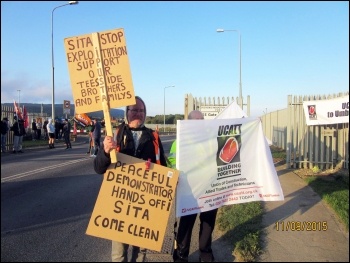Teesside: Pay the Rate protest
John Malcolm, Teesside Socialist Party
Following a meeting of over 100 construction activists on 7th September a decision was taken to restart the regular Friday protests at the Energy from Waste plant at Wilton on Teesside. The protests have been called because SITA Sembcorp have laid off workers and other contractors have employed workers at below nationally agreed rates of pay (see report of Liverpool protest in the Socialist 3-9 September).
The meeting was addressed by Unite and GMB officers as well as lay officials. It was reported that during the suspension of the protests, the construction unions along with independent translators were allowed onto the site on 17th August in order to speak to the mainly foreign workers employed by the contractors. It was confirmed that the tradesmen are being paid rates far below the agreed rates.
Mechanical fitters are paid 9-10 euros per hour or £7.20 and welders are on 13 euros or £9.36. This is well below the nationally agreed rates of pay and less than half in some cases. The majority of workers are paid by a company named as Bilfinger Duro Jakovich.
Workers also have deductions for lodgings taken from their pay and they have to work for three months before they are allowed a visit home – with no holiday pay.
It was reported that some of the workers (thermal insulators) were being paid six euros per hour although this was not confirmed as they were not on site at the time of the visit.
The Merseyside Recycling and Waste Authority (MRWA) gave SITA a 30 year contract worth £1.18 billion to manage 430,000 tonnes of waste each year. The waste will be transported to the Wilton plant where it will be processed and converted to energy.
MRWA gave assurances about pay and support for the campaign at the previous lobby in Liverpool, although nothing has changed. Unions are calling for a forensic wage audit to be carried out and are willing to fund this.
The protests have the support of workers on the site despite the massive disruption caused and delays in accessing the site.
SITA issued a letter last week, before Friday’s protest outside the Wilton energy plant. This warned of ‘severe consequences’ if the protests continued and raised the threat of arrest due to trespass on what is public land. The letter went on to say that the police had been informed with the relevant ‘offences’ quoted. This had no impact on the day, with the protest being well supported and effective.
This is a crucial dispute as other construction projects are being planned for the area with the prospect of foreign workers being exploited and local workers excluded or blacklisted from the sites, which are situated in an area of high unemployment.
Union officers have the support of local Labour MPs and the GMB has invited the newly elected Labour leader Jeremy Corbyn to visit Teesside and hear from the workers directly.
At the recent meeting there were calls to increase the pressure on the company with further disruption of the site, including a full day of protest as it was reported that some of the workers were avoiding the protests by going in later and working longer.
The decision to restart the protests was unanimous; however it was clear there is some frustration as there have been over 20 protests with little movement from the company so far. The Construction Committee needs to find ways to escalate the dispute and to take the campaign wider, involving other sites on a national basis if possible, and also to take the campaign to the public.












